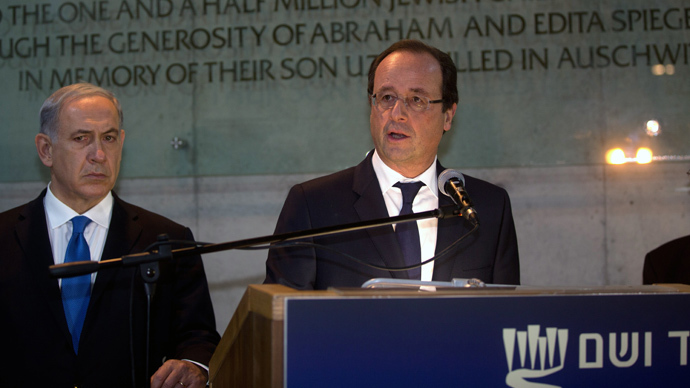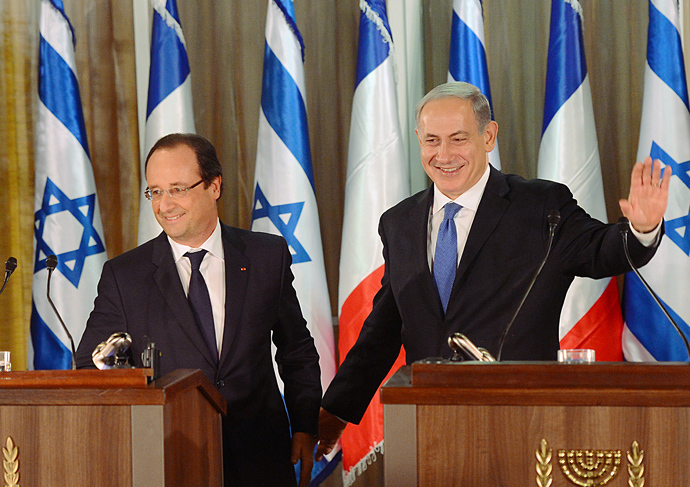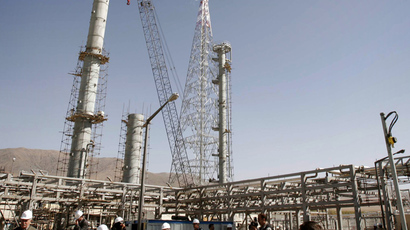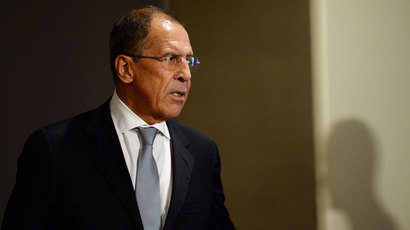Hollande backs Israel on Iran nuclear deal, pledges to keep 'demands and sanctions' in place

French President Francois Hollande assured Israel on Sunday that France will oppose the easing of sanctions on Iran until it is certain that Tehran has ended its pursuit of nuclear weapons.
“France will not give way on nuclear proliferation. So long as we are not certain that Iran has renounced nuclear arms, we will keep in place all our demands and sanctions,” Hollande said during a welcoming ceremony at Tel Aviv’s airport at the beginning of his three-day visit to Israel.
The French president’s words give support to an intense campaign
by Israeli Prime Minister Benjamin Netanyahu to toughen the terms
of a proposed nuclear deal with Iran ahead of the third round of
talks in Geneva this week.
But Iranian policymaker and scholar Seyed Hossein Mousavian told
RT that France is blocking a peaceful deal because of unfounded
claims by Israel.
“France has blocked the peaceful deal because of Israeli
claims. I think this is a historical mistake France is making. It
was for twenty years they [Israel] are saying that Iran will
possess a nuclear bomb within one year, or two years, therefore
it has been proven to the international community that the
Israelis are lying,” he said.
Iran will likely be the most important subject on the agenda
during talks between the Israeli and French leaders. Israel
praised France for taking a tough line against Iran during the
last round of negotiations on November 7-8. Meanwhile, Tehran has
accused Paris of deliberately blocking an agreement.

Netanyahu has slammed a proposal to be discussed during the talks
- which will resume November 20-23 - whereby economic sanctions
on Tehran will be eased if Iran suspends part of its nuclear
program.
Netanyahu, known for his lack of tolerance and harsh stance
towards the Iranian regime, believes that current measures must
not only remain in place, but be strengthened until Iran has
dismantled all of its uranium enrichment program. He maintains
that until this happens, Iran will have the capability of
developing a nuclear bomb.
Certain voices in US Congress are also pushing for tougher
sanctions against Iran. Proposed legislation to impose new
sanctions could arrive on the Senate floor next week.
US President Barack Obama has urged US lawmakers not to impose
new sanctions on Iran while talks are still ongoing. Meanwhile,
Secretary of State John Kerry has stirred controversy in Israel
by accusing Tel Aviv of overreacting to the proposed deal.
However, Netanyahu has said that the disagreement with the US is
a minor one.
“John Kerry is an old friend of mine and is also a friend of
Israel. I want to clarify that even among the best of friends
there can be disagreements, certainly on matters that concern our
future and our destiny,” he said.
A senior US official remained upbeat on the negotiations, stating
on Friday that a deal can be reached with Iran.
“For the first time in nearly a decade, we are getting close
to a first step that would stop the Iranian nuclear program from
advancing and roll it back in key areas,” the official told
reporters.
In comments broadcast on Saturday, Russian Foreign Minister
Sergey Lavrov said that a preliminary agreement with Iran was
near.














